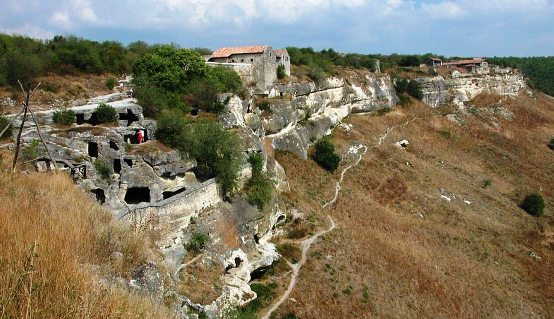 Researchers are
not unanimous as to the time of the town`s appearance. Some of them
consider it to be a Byzantine fortress founded in the 6th century. Researchers are
not unanimous as to the time of the town`s appearance. Some of them
consider it to be a Byzantine fortress founded in the 6th century. During the early
period of the town`s history, it was mainly populated by Alens, the most
powerful of late Sarmatian tribes of Iranian descent. They began
penetrating the Crimea from the 2nd century A.D. Settling down in the
mountainous Crimea, the Alans adopted Christianity. They angaged in
agriculture, cattle-breeding and handicrafts. In written sources it is
mentioned in the 13th cen. under the name of Kyrk-Or (Forty
Fortifications). This name lasted until the mid-17th century.
In the 1299 the
Tatar horde of Emir Nogai raided the Crimean peninsula. Kyrk-Or was
among the sacked towns. Having seized the town, the Tatars quartered
their garrison in it.
At the turn of the
15th cen., Tatars settled Karaite craftsmasters in front of the eastern
line of fortifications; the Karaites built a second defencive wall to
protect their settlement, and thus a new part of the town appeared.
I the 15th cen.
the first Krimean Khan, Hadji-Girei, who realized the fortress`
advantages, turned the old section of the town into his fortified
residence. Years later it also safeguarded khans during their
internecine strife and was a reliable shelter during their struggle
against the Golden Horde for independance.
After the defeat
of the Golden Horde, the Crimean Khanate became considerably stronger.
The significance of Kyrk-Or as a stronghold declined, and the Crimean
Khan Mengli-Girei moved his capital to Bakhchisarai. The old town
remained a citadel of Bakhchisarai. The old town remained a citadel of
Bakhchisarai and a place of interaction for aristocratic prisoners.
In the mid-17th
century Tatars left Kyrk-Or. Only Karaites remained to live there. They
were the descedants of ancient Turkic-speaking Khazars, whose state in
the 7th-10th cen. included parts of the Crimea. In the 8th cen. the
Khazar Kaganate adopted Judaism. Tatars considered Karaites to be Juws,
hence the town gradually acquired the name of Chufut-Kale, which in
Turkic meant "Juwish fortress". After the Tatar departure, Karaites
lived there for over 200 years. They adopted Karaism, a doctrine which
regects rabbinism and talmudism and bases its tenets on the
interpretation of the Pantateuch. With time, the word "Karaite" came to
refer to the name of the people.
After the Crimea`s
conquest and its inclusion into the Russian empire, the Karaites
declared their loyalty to the new rulers. In return the goverment
granted them privileges, enabling them to live anywhere in the empire.
From that time on, Chufut-Kale became deserted. Its dwellers left the
plateau and settled in cities. By the mid-19th cen. the town ceased to
exist.
We can suggest a lunch at the Crimean Tatar cafe http://alie.com.ua/foto after excursion: local
cuisine, oriental flavor, natural products, Crimean Tatar music,
riding. | 